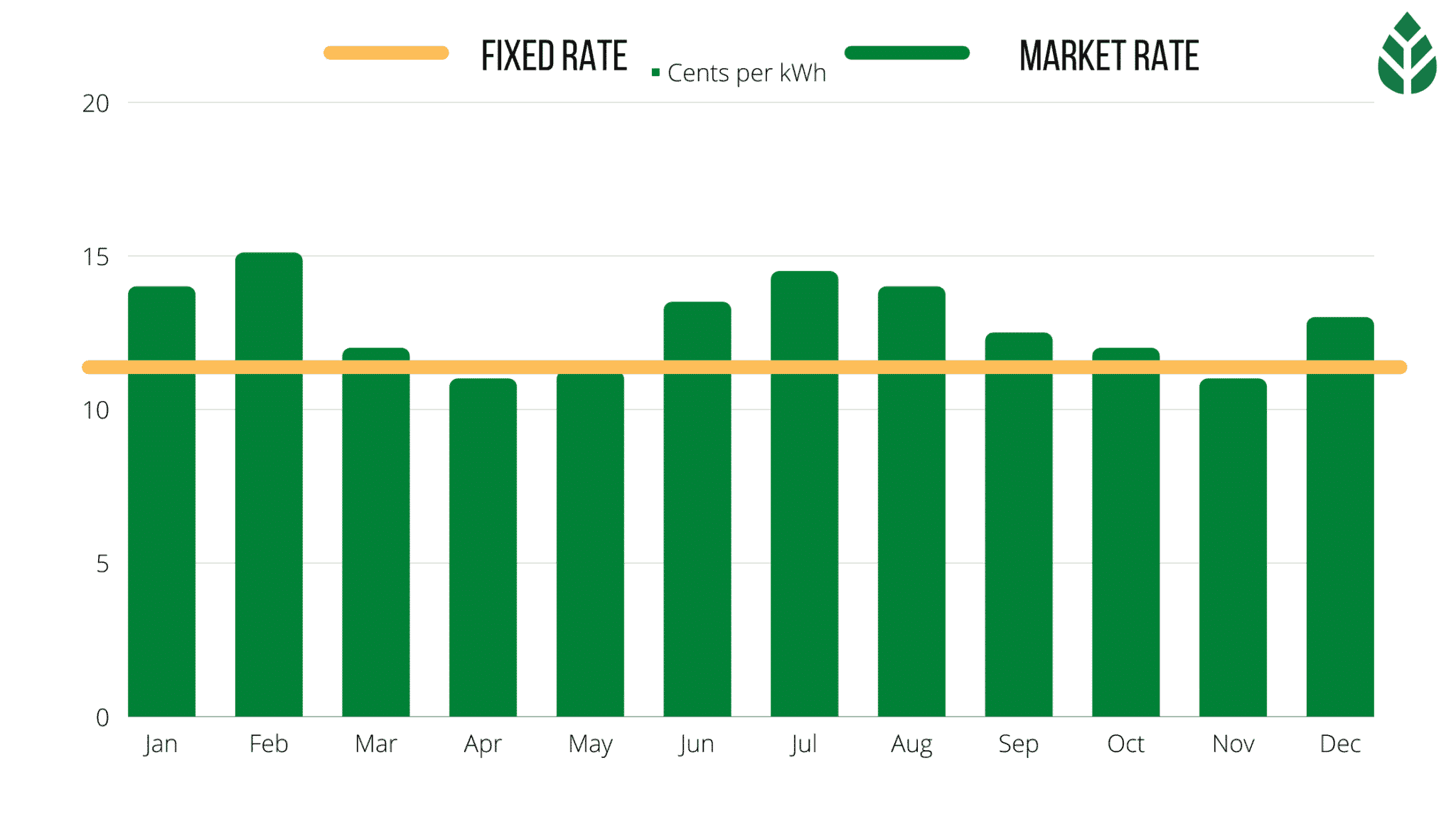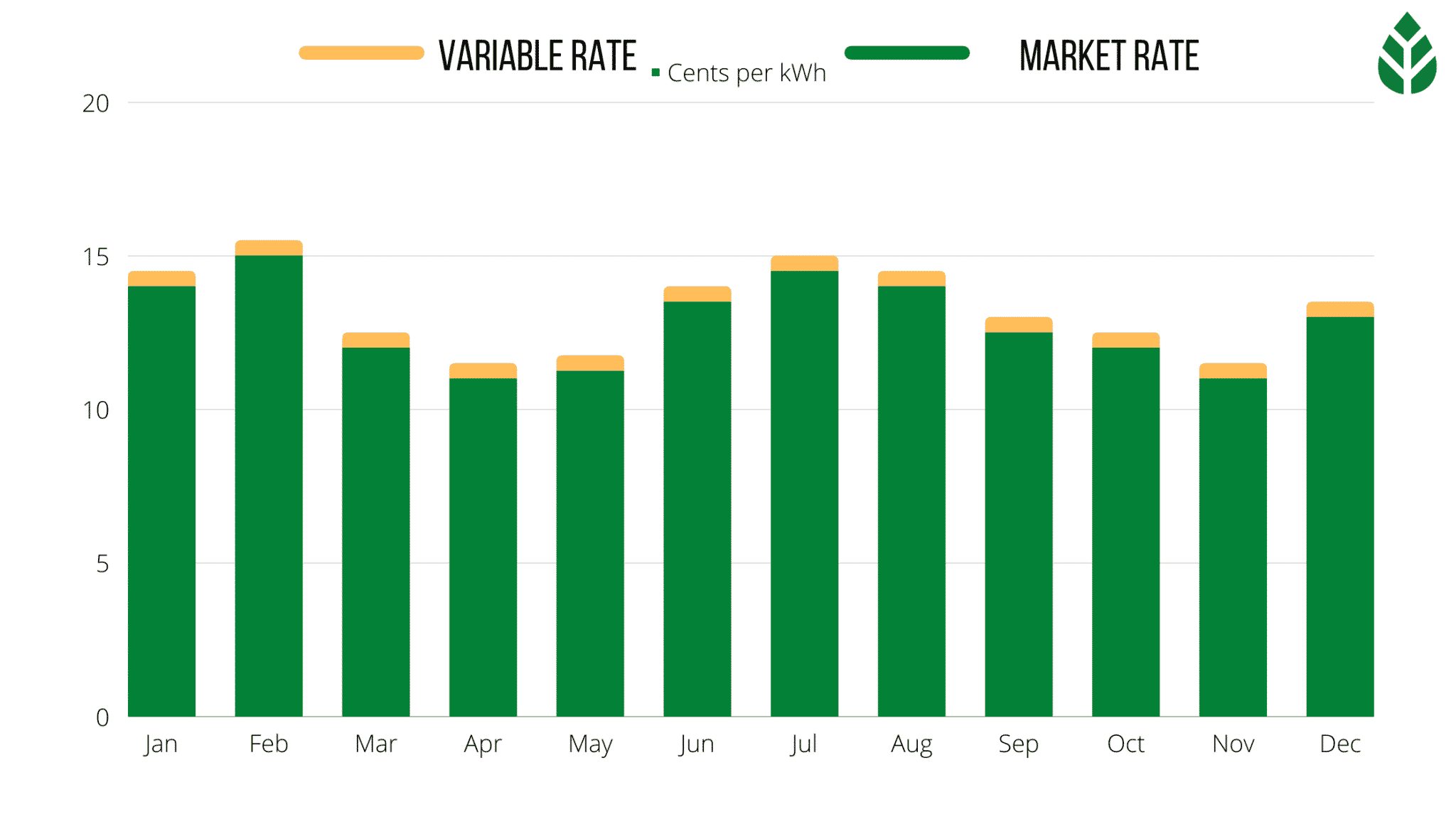
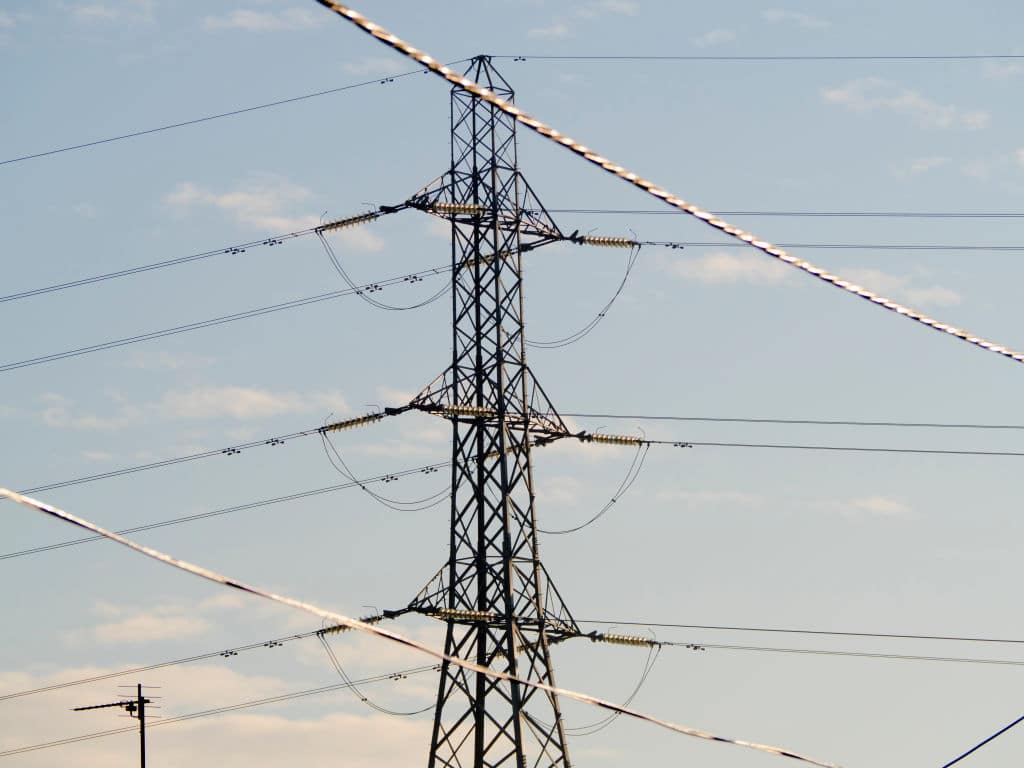
Compare Maine Electricity Rates (2024 Best Prices)
Here’s a quick overview of Maine electricity rates:
- Current average retail rate of electricity: 23.03 cents per kilowatt-hour (kWh)
- Current range of electricity prices (from renewable sources) in ME: 11.48 to 18.8 cents/kWh
- Average monthly electric bill: $104.42
- Average energy usage: 570 kWh
Figures accurate as of time of publication.
Each product and or company featured here has been independently selected by the writer. You can learn more about our review methodology here. If you make a purchase using the links included, we may earn commission.
Who Has the Best Energy Rates in Maine?
Consolidated Communications has the cheapest energy rates for a renewable energy plan in Maine — the Energy Rewards plan with a six-month contract term comes in at just 11.48 cents per kilowatt-hour (kWh). You can click below to see a side-by-side comparison of the energy prices from the top Maine electric companies.
Maine Energy Rates
In 2000, Maine deregulated the energy market, which gave all Maine residents an energy choice and let each homeowner select the electric supplier they felt was best for their needs and budget. The average cost of electricity in Maine — according to the Energy Information Administration (EIA) — hovers around 23.03 cents per kilowatt-hour, making it one of the most expensive areas in New England for power.1 Companies offering renewable energy plans range between 11.48 cents and 18.8 cents per kWh.
Your cost of electricity will depend both on the electric supplier that produces the energy you consume and the utility that delivers energy to your home via the power lines. While you can choose your supplier, you can’t choose your utility company. Most customers are serviced by the utilities Central Maine Power Company (CMP) and Versant Power (specifically in the Bangor Hydro District), so delivery rates don’t vary much throughout the state. The company that supplies your energy can cause more drastic rate fluctuations.
Compare Electricity Rates in Maine
The table below includes a side-by-side comparison of some of the top energy plans from popular electric suppliers in Maine, including the standard offer price. As a website focused on sustainable solution, EcoWatch strives to promote clean energy, so we will exclude companies that don’t offer renewable energy plans. We’ll discuss the benefits of renewable energy plans further below.
| Plan Name | Term (months) | Plan Rate (¢/kWh) |
| Ambit Energy Green Plan 12 | 12 | 16.5 cents |
| Ambit Energy Green Plan 24 | 24 | 16.75 cents |
| CN Brown Energy Green Choice 7 | 7 | 13.53 cents |
| CN Brown Energy Green Choice 24 | 24 | 14.73 cents |
| Consolidated Communications Energy Rewards 24 Month Fixed Wind | 24 | 12.49 cents |
| Consolidated Communications Energy Rewards 6 Month Fixed Wind | 6 | 11.48 cents |
| SmartEnergy 6 Month Plan | 6 | 18.8 cents |
| Think Energy Think Clean 12 | 12 | 16.1 cents |
| Think Energy Think Clean 18 | 18 | 15.7 cents |
| Think Energy Think Clean 24 | 24 | 15.5 cents |
*Rates will vary based on your public utility; you’ll see the rates above if your utility is Central Maine Power Company (CMP). Rates are subject to change.

Think Energy
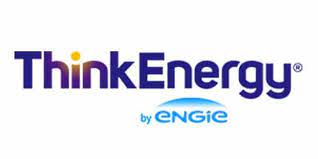
Regional Service
Average cost
Pros
- Wide variety of contract term options
- Wide variety of plan options
Cons
- Charges contract cancellation fees
- No prepaid or no-deposit plans
- Slightly high number of complaints versus competitors
- No satisfaction guarantee
- Expensive

Ambit Energy

Regional Service
Average cost
Pros
- Many years of experience
- Makes charitable contributions
Cons
- Charges contract cancellation fees
- Not as many renewable energy options as competitors
- Some reports of misleading door-to-door sales
- History of issues with misleading marketing

SmartEnergy

Regional Service
Average cost
Pros
- Many years of experience
- All plans use clean energy
- No early termination fees
Cons
- No prepaid or no-deposit plans
- Expensive
- Low number of plans to choose from

CN Brown Energy
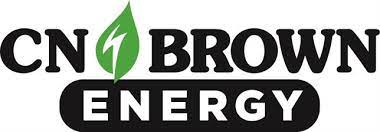
Regional Service
Average cost
Pros
- Many years of experience
- Values transparency
Cons
- Not as many renewable energy options as competitors
- Low number of plans to choose from

Consolidated Communications

Regional Service
Average cost
Pros
- Many years of experience
- Low rates
Cons
- Charges contract cancellation fees
- No prepaid or no-deposit plans
- Not as many renewable energy options as competitors
How to Find the Best Electricity Rates in Maine
It might seem like a simple task to find the best electricity rates in Maine, but the best plan for you is based on more than just the price per kilowatt-hour. Below, we’ll discuss two additional factors that are crucial to consider that can have a major impact on how well a certain power plan suits you.
Your Energy Usage
Many Maine residents fail to consider their average monthly energy usage when choosing an electric supplier, but this can make a big difference in how suited a plan is to your home. Many utility companies use a tiered plan for energy, which means you’re charged differently for electricity based on how much you use. Normally, these plans are most affordable and most appropriate for residential customers who use around the average amount of energy, or 570 kWh per month in Maine. If you use well above or below that amount, a tiered plan might not be best for you.
The time at which you consume energy is also important. If you know that you consume most of your energy during off-peak hours, a time-of-use (TOU) plan might work better for you and offer more energy savings. Prices are typically regulated by the Maine Public Utilities Commission (MPUC).
Contract Length
The contract length is another factor that many Mainers fail to consider. Fixed-rate energy plans typically include a contract term, which means you’re locked into a specific energy price for the entire length of the contract. Longer contract periods typically come with lower per-kWh prices, but some electricity customers don’t like contracts because they limit their freedom of energy choice for some period of time.
You should also review your contract for additional stipulations and terms, including early- termination fees, sign-up fees and introductory rates that could change over the contract term. If you’re not sure which energy plan is right for you, you can use this EcoWatch tool or click below to help you narrow down your options.
Types of Electricity Plans in Maine
There are a few different types of energy plan you’ll come across when searching for a new electric supplier. While options are great, the terminology can be overwhelming. Below, we’ll discuss the different electricity plans in Maine to help demystify some of the options you have.
Fixed-Rate Plans
Fixed-rate plans include a single rate that you’ll pay per kilowatt-hour (kWh) for the entire length of your contract. This is favorable to many people because it provides peace of mind that you won’t see unexpected rate increases during times of high demand. We generally suggest fixed-rate plans for all homeowners, although it’s important to know when your contract ends, as fixed-rate plans can sometimes automatically turn into variable-rate plans at the end of the contract period.
Some homeowners get confused by the fixed rate and think their monthly bills will never change. That’s not the case because only the rate per kWh is fixed. If you use more kilowatt-hours in a given month, your energy bill will be higher.
| Pros of a Fixed-Rate Energy Plan | Cons of a Fixed-Rate Energy Plan |
| Your rate per kWh will never increase | Can’t take advantage of decrease if local electricity rates dip |
| Helpful for budgeting since you’ll always know what you’ll be charged for energy | Most fixed-rate plans have a mandatory contract term and early cancellation fees |
Variable-Rate Plans
Variable-rate plans have a variable per-kWh rate rather than a fixed one. The rate is based on local energy prices, which are influenced primarily by electricity supply and demand. While variable-rate plans can sometimes provide more energy savings than fixed-rate options, they can also spike unexpectedly if energy supply dips or demand increases or during a time of crisis.
Variable-rate plans typically don’t require a contract, so they don’t have early-termination fees. We’ll include some pros and cons of these plans in the table below.
| Pros of a Variable-Rate Energy Plan | Cons of a Variable-Rate Energy Plan |
| Energy rates can be lower than fixed-rate plans if local prices are low | Electricity costs can rise during high demand or times of crisis |
| Most don’t require contracts or have early-termination fees | You could end up spending more on energy if local prices are higher than the fixed-rate prices |
No-Deposit and Prepaid Energy Plans
Many energy plans in the State of Maine require some type of up-front payment for activation, which is a hedge against losses from non-paying customers. If you’re looking to avoid a deposit and can pass a credit check, a no-deposit plan might be best for you. These plans use your credit score to verify the likelihood of payment, so they don’t require any deposit.
If you can’t pass a credit check or you’re just looking for more control over your energy expenses, you could also choose a prepaid energy plan. These plans require that you put money into an account to use for electricity, but you’re only ever charged for what you use. There are no surprise bills, no deposits required and no contracts or termination fees.
| Pros of a Prepaid Energy Plan | Cons of a Prepaid Energy Plan |
| Minimal upfront costs | You might experience an outage if you forget to add money to your account |
| You’ll always know the maximum you’ll spend on electricity | Many prepaid plans have slightly higher per-kWh prices |
| No contracts and no early-cancellation fees |
Green Energy Plans
Green energy plans are just like normal plans, but all the energy you consume and receive comes from renewable energy sources including solar and wind. As an eco-friendly website, we strongly recommend green energy plans, as they help reduce your carbon footprint and are beneficial to the environment, often for the same price or less than a plan that uses coal or natural gas to produce energy.
Maine currently has a Renewable Portfolio Standard (RPS) goal of producing 80% of its electricity via clean energy sources by 2030 and 100% by 2050.2 It’s possible that the state will incentivize transitioning to green energy plans in the near future to reach these goals, which could mean that these plans become more affordable and more numerous in the coming years.
| Pros of a Green Energy Plan | Cons of a Green Energy Plan |
| Reduces your carbon footprint and contribution to pollution | Green energy plans can sometimes be a bit more costly — usually 1 to 2 cents more per kWh — than other plans |
| Allows you to support clean energy without a large up-front cost | Fewer plans available |
Business Energy Plans
Finally, business energy plans are designed specifically for the higher energy needs of commercial customers, including commercial buildings, schools, government agencies, churches and more. Only a handful of electricity suppliers offer plans for business customers, so you’ll have to limit your search to business plans if you need one for your company or building.
Electric Companies and Providers in Maine
The deregulation of the energy market in Maine means choice for electricity customers and, ultimately, lower prices for electricity. However, more options make your decision more challenging. Below are some of our top-rated electric companies in Maine that offer renewable energy plans.
Think Energy
- Multiple contract terms provided
- 100% renewable energy plans are a standard offer
- Fixed-rate prices per kWh
- Positive customer reviews
SmartEnergy
- Positive customer reviews
- 100% renewable energy plans available
- Fixed-rate contracts
Ambit Energy
- 100% green energy plans available
- Fixed-rate contracts offered
- A+ rating with the Better Business Bureau (BBB)
- Multiple contract terms available
Consolidated Communications
- Multiple contract terms available
- Fixed-rate contracts
- 100% green energy plans offered
CN Brown Energy
- A+ rating with the BBB
- Multiple contract terms available
- 100% renewable energy plans offered
- Fixed-rate contracts
What to Look For When Choosing an Electricity Provider in Maine
Choosing an energy supplier in Maine can be a challenge for some homeowners because the deregulated energy market means there are many options. Some customers make the mistake of looking just at per-kWh rates, but there are many other factors that are crucial to consider. Below, we’ll include some additional things to think about when choosing an energy provider in Maine.
- Plan Options: It’s important to look at the plan options provided by an electricity supplier, which could include fixed-rate plans, variable-rate plans, green energy plans and more. Finding a supplier that provides the plan you want is essential.
- Source of the Energy: Many Maine electric suppliers still acquire most of their energy from the burning of fossil fuels. We strongly recommend considering a plan that includes 100%-renewable energy to maximize your positive effect on the environment.
- Energy Prices: The standard offer rate per kWh will always be an important factor for homeowners. Cheap energy rates are often more beneficial, but you also need to weigh them against the other factors discussed in this section.
- Contract Terms: You should always pay attention to the length of the contract you’re signing, as it can lock you into the agreement for years. You should also look at the fine print, which could include information about introductory rates, sign-up fees, early- cancellation fees and more.
- Customer Reviews: Online customer reviews are a great place to consult to see what kind of experience you can expect from an electric supplier. We recommend looking at both positive and negative reviews to get a fair assessment of a company.
- Company History: Electric companies that have been in the industry longer are more likely to provide consistent service.
FAQ: Maine Electricity Plans
We’re thrilled to get questions on a regular basis from Maine homeowners about which energy provider they should choose. Below are some of the most common questions we see from homeowners in your area, along with our responses.
There are many energy suppliers in Maine to choose from, but the one with the most affordable 100%-renewable energy plan is Consolidated Communications. The company’s Energy Rewards program with a six-month contract has a fixed-rate kWh price of just 11.48 cents. Compared to the average kWh price in Maine of 23.03 cents, this is a great way to save money on electricity and promote clean energy.
The answer to this question will vary depending on the specific homeowner. One resident might prefer a fixed-rate plan with a long contract for price stability, while another might prefer a variable-rate plan with no contract for the freedom and potential savings. While there is no universal answer, Think Energy is considered one of the best in our ratings. This company offers 100%-renewable energy plans and fixed-rate contracts, and it has multiple term options for plan customization.
With the energy market in Maine being deregulated, one of the best ways to reduce your energy bills is to shop around for the best electricity plan. Green energy plans in Maine range from around 11.48 cents per kWh up to 18.8 cents, so choosing the best one for your needs could save you an average of nearly 10 cents per kWh if you’re paying an average price currently.
Many homeowners in Maine also reduce their energy bills by completing energy efficiency upgrades on their homes. These can include replacing insulation, windows and doors, installing smart thermostats to limit cooling and heating costs and replacing light bulbs with high-efficiency options. You can check out our guide on home energy efficiency for more information.
Just as with energy suppliers, there is no universally ideal energy plan, and each homeowner might prefer a different option. You should consider multiple factors when selecting a new energy plan, including your monthly energy consumption, the rate per kWh, the contract term you want and more. We recommend starting by looking at green energy plans offered by Think Energy, SmartEnergy, Ambit Energy, Consolidated Communications and CN Brown Energy to get started.

 233k
233k  41k
41k  Subscribe
Subscribe 
